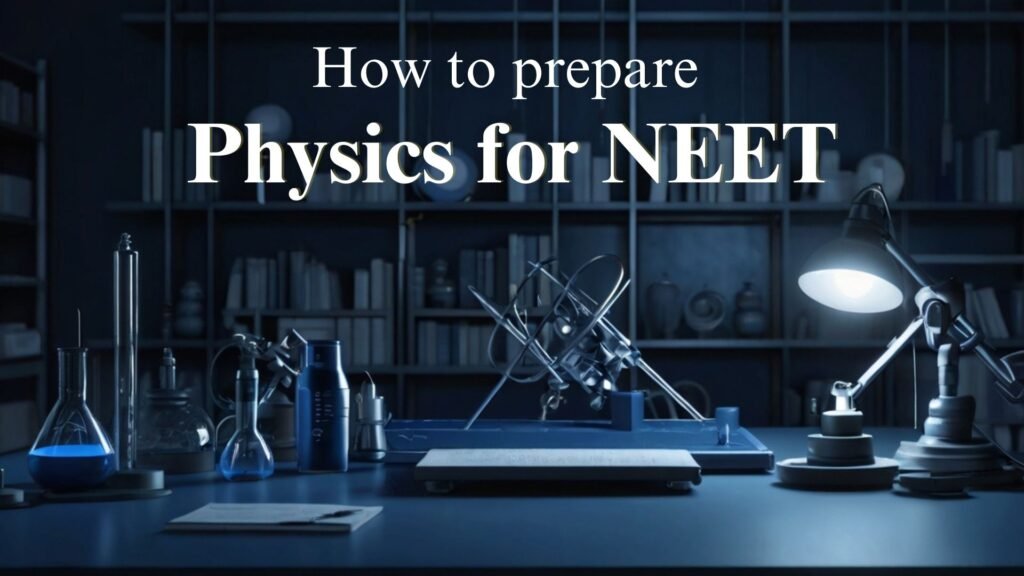
How to prepare Physics for NEET
NEET (National Eligibility cum Entrance Test) is a competitive exam for aspiring Indian medical students. Among all subjects in NEET Physics is a crucial one. It makes an important contribution to the final score. This article will give you a comprehensive strategy for covering the syllabus, study techniques, reference materials, and time management tips.
Understanding the Syllabus
The NEET Physics syllabus is broadly divided into two sections:
1. Class 11 Physics Syllabus
2. Class 12 Physics Syllabus
1. Class 11 Physics Syllabus
- Physical World and Measurement
- Kinematics
- Laws of Motion
- Work, Energy, and Power
- Motion of System of Particles and Rigid Body
- Gravitation
- Properties of Bulk Matter
- Thermodynamics
- Behaviour of Perfect Gas and Kinetic Theory
- Oscillations and Waves
2. Class 12 Physics Syllabus
- Electrostatics
- Current Electricity
- Magnetic Effects of Current and Magnetism
- Electromagnetic Induction and Alternating Currents
- Electromagnetic Waves
- Optics
- Dual Nature of Matter and Radiation
- Atoms and Nuclei
- Electronic Devices
The first step is to understanding the syllabus thoroughly. It helps you to identify the topics that require more focus.
Study Techniques
1. Concept clarity
A solid understanding of basic concepts is essential. You should take advantage of NCERT textbooks. They are aligned with the NEET syllabus and clear guidance.
2. Problem Solving Skills
Problem-solving skills are the key of your success in Physics. You have to practice numerical problems regularly. Start with simple problems and gradually move to complex ones. This will enhance your analytical thinking and application skills.
3. Regular Practice
Regularity is essential to rank in NEET. Dedicate specific hours each day to Physics. Regular practice of problems, conceptual questions is necessary to apply the knowledge.
4. Revision
Constant revision is vital for your ranking. Make short notes for quick revisions. You can summarize each chapter, highlight important formulas, concepts, and problems. This will be extremely useful during final preparation.
5. Mock Tests and Previous Year Papers
Taking mock tests and solving previous years’ question papers will help you a lot. This will help you to understand the exam pattern, time management, and the type of questions. Analyze your performance to identify your weak areas.
Reference Materials
1. NCERT Textbooks
The NCERT textbooks for Class 11 and 12 are the most important resources. They cover the entire of Physics NEET syllabus. These are sufficient for building your strong foundation.
2. HC Verma – Concepts of Physics
This book is highly recommended for your exam. The reference has clear explanations and a wide range of problems, from basic to advanced levels. It is excellent for building conceptual clarity and problem-solving skills.
3. DC Pandey – Understanding Physics Series
This series provides a comprehensive set of books in Physics. It includes theory, solved examples, and practice questions. These are making it a valuable resource for NEET candidates.
5. Online Resources
Websites like ‘Khan Academy’, ‘Coursera’, and YouTube channels like ‘Physics Galaxy’ provide free tutorials and lectures that can be useful your preparation.

Handling Difficult Topics
Certain topics in Physics may seem more challenging than others. Here’s how to tackle them:
- Don’t hesitate to ask for help from your teachers, classmates or online reformers. Clarify your doubts immediately before accumulate them.
- Studying in groups can be helpful to you.
- You can use diagrams, flowcharts, and videos to understand complex topics.
- Try to break down difficult topics into smaller sections. That can help you to clarify your difficulties.
Exam Day Tips
- Time Management: You have to make a sensible time division between Biology, Chemistry, and Physics. Try to finish the Chemistry portion in about 45 minutes.
- Accuracy over Speed: While quickness is vital, accuracy is critical. You have to avoid guessing because NEET has negative marking.
- Stay Calm and Focused: Maintain your patience during the exam. A clear mind is more productive.
Conclusion
A structured preparation strategy and staying consistent in your efforts can significantly improve your chances to score high in Physics. So you can gain a desired medical seat. Remember that the secrets of passing NEET are hard work and determination. Stay motivated, stay focused, and give your best effort. Good luck!
Related Articles
- Biological Classification MCQ for NEET
- Cell: The unit of life MCQs
- Human Health and Disease MCQs for NEET
- Morphology of Flowering Plants
- NEET Syllabus 2025
- How to prepare for NEET 2025
- Best Books for NEET
- 10 tips to crack NEET in first attempt
- 16 tips to prepare NEET at home
- 10 Best NEET Coaching Center in India
- Best time to start preparing for NEET
- Chemistry NEET Preparation
- Which is best Institute for NEET
- What is NEET and JEE
- NEET Result 2024
- NEET Scam 2024
FAQs
- Why is Physics important for NEET?
Physics is one of the three subjects tested in NEET. It plays a vital role in the overall score. A strong grip of Physics concepts can boost your rank.
- How many questions are there in the Physics section of NEET?
There consist 45 Physics questions in NEET. It contributes to 180 marks out of the total 720.
- What are the best books for NEET Physics preparation?
Some of the recommended books for NEET Physics preparation are:
- NCERT Physics Textbooks for Class 11 and 12
- Concepts of Physics by H.C. Verma (Vol 1 & 2)
- Objective Physics by D.C. Pandey
- Are there any online resources or coaching centers for NEET Physics preparation?
Yes, there are many online platforms and coaching centers that offer NEET Physics preparation courses. Some popular ones include:
- How should I revise Physics before the NEET exam?
- Make a revision timetable covering all topics.
- Focus on key formulas and concepts.
- Solve mock tests and previous years’ papers.
- Review mistakes and weak areas.
- Stay calm and confident during the revision phase.


